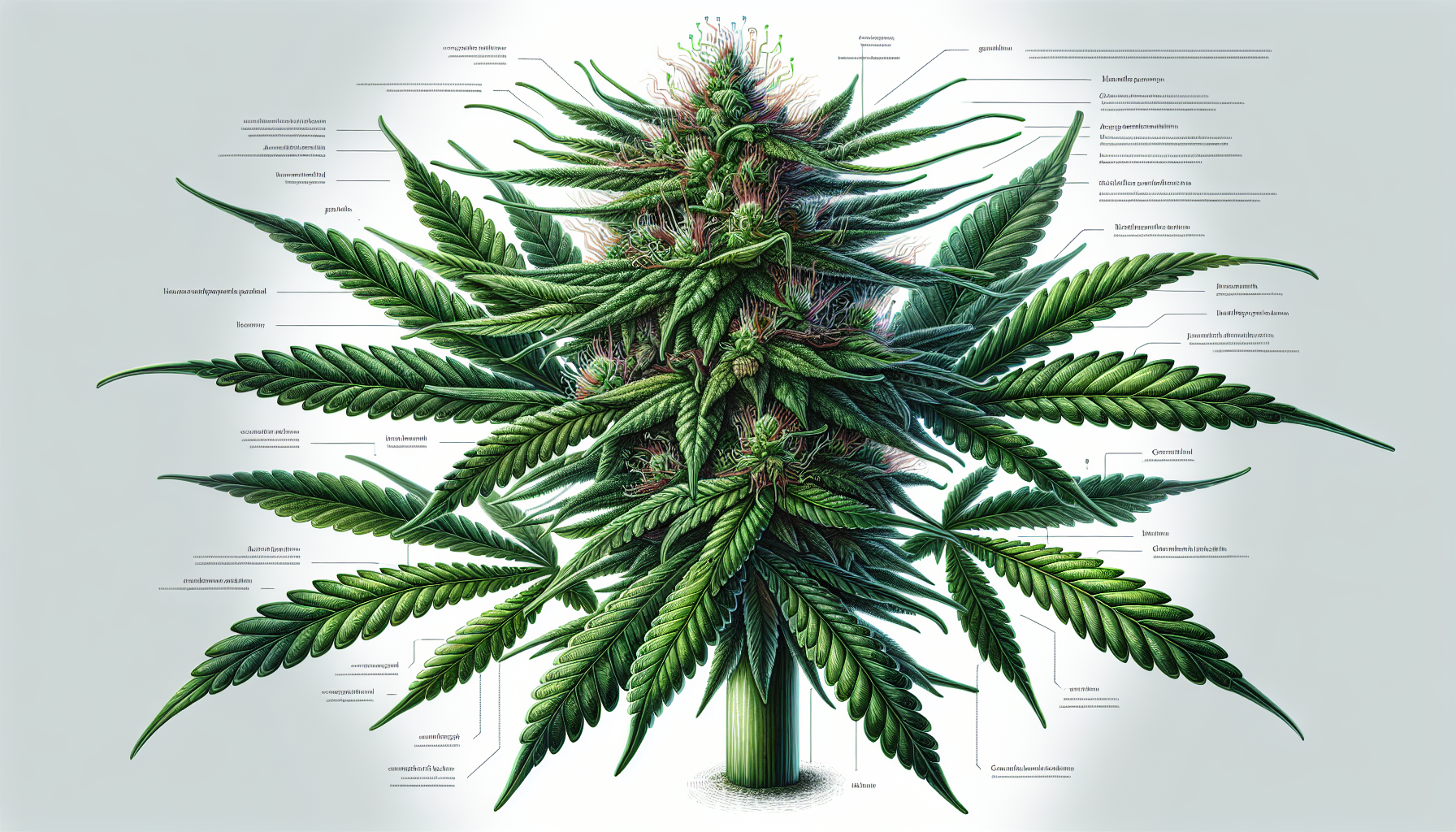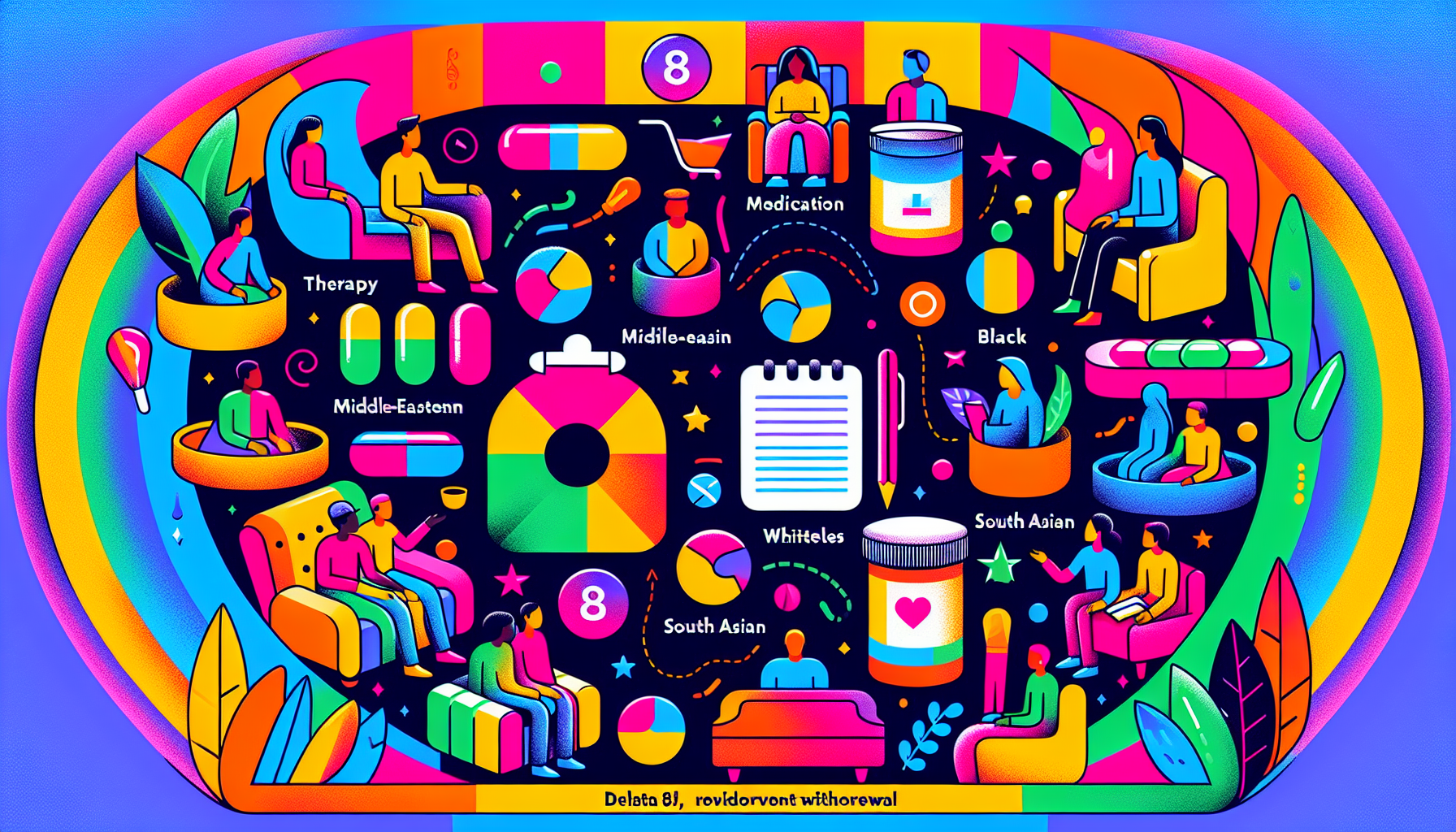Delta 8 Withdrawal: Symptoms and Coping Strategies
Delta 8 withdrawal happens when you stop using Delta 8 THC regularly and start feeling its absence in your body and mind. Symptoms can be uncomfortable and disruptive. Here, we’ll discuss what to expect and how to cope with Delta 8 withdrawal.
Key Takeaways
Delta 8 THC, while milder than Delta 9 THC, can still lead to dependency and withdrawal symptoms due to changes in the body’s endocannabinoid system.
Withdrawal symptoms from Delta 8 include a combination of physical (nausea, headaches, insomnia) and psychological symptoms (anxiety, irritability, cravings), which can make the withdrawal process difficult.
Coping with Delta 8 withdrawal involves a multifaceted approach including building a support system, adopting healthy lifestyle practices, utilizing relaxation techniques, and seeking professional help.
Understanding Delta 8 THC

Delta 8 THC is a minor cannabinoid present in the cannabis plant. It has psychoactive effects that are similar to Delta 9 THC, but they are milder. The differences in psychoactive effects between Delta 8 and Delta 9 THC arise from their varying affinities for cannabinoid receptors; Delta 8 binds to CB1 receptors in the brain less effectively, leading to its milder effects. This distinction has earned Delta 8 the nickname ‘diet weed,’ as many believe it to be a safer alternative with fewer risks.
Despite its lower potency, Delta 8 THC still offers potential benefits, including pain relief and relaxation. It is available in various forms, such as vape cartridges, edibles, tinctures, capsules, and concentrates, making it accessible to a wide range of users. However, this accessibility has also led to misconceptions about its safety and potential for addiction.
Delta 8 THC interacts with the endocannabinoid system, which regulates mood, pain, and other physiological processes.
Although Delta 8 may appear less harmful than regular cannabis or Delta 9 THC, its use can still result in dependency and withdrawal symptoms due to tolerance and physical dependence over time.
Why Delta 8 Withdrawal Occurs

Regular use of Delta 8 THC leads to changes in the endocannabinoid system, which can influence mood and physiological processes. When users stop consuming Delta 8, withdrawal symptoms occur as the body responds to the absence of the substance. This reaction is a result of the body’s adaptation to the presence of Delta 8, leading to physical dependence and the need for more of the substance to achieve the same effects.
The withdrawal process can be challenging, as it involves both physical and psychological symptoms. While the risk of addiction to Delta 8 THC is lower than other substances, it can still lead to dependency and withdrawal symptoms. Knowing why these symptoms occur helps in managing them effectively.
Chronic intake of Delta 8 THC can result in physical dependence, similar to other cannabinoids. The body’s reliance on Delta 8 for certain physiological functions means that stopping its use can create a significant imbalance, leading to a range of withdrawal symptoms. Identifying these symptoms and their root cause is the first step in managing the withdrawal process.
Common Symptoms of Delta 8 Withdrawal
Withdrawal from Delta 8 THC can lead to a variety of physical and psychological symptoms, causing significant discomfort and distress. Physical withdrawal symptoms and THC withdrawal symptoms often include nausea, headaches, insomnia, and gastrointestinal discomfort. These symptoms can severely impact an individual’s comfort and well-being, making the withdrawal process challenging.
Psychological symptoms are also common during Delta 8 withdrawal. Individuals may experience irritability, anxiety, mood changes, and strong cravings for Delta 8. These psychological symptoms can contribute to emotional instability and make it difficult for individuals to cope with the withdrawal process. Recognizing these common symptoms helps in managing them effectively and seeking appropriate support.
Physical Symptoms
Physical symptoms of Delta 8 withdrawal include a range of discomforts that can significantly affect an individual’s well-being. Nausea and stomach pain are common physical symptoms reported during Delta 8 withdrawal. While nausea is less common than other withdrawal symptoms, it tends to occur more frequently in female withdrawal cases.
Headaches and insomnia are also typical symptoms of Delta 8 withdrawal. These symptoms can disrupt daily life and make it difficult for individuals to maintain their usual routines. Gastrointestinal discomfort is another common issue, adding to the physical distress experienced during withdrawal.
The presence of these physical symptoms can significantly impact overall comfort and well-being. Effectively managing these symptoms can make the withdrawal process smoother. Addressing them helps individuals better handle the challenges of Delta 8 withdrawal.
Psychological Symptoms
Psychological symptoms of Delta 8 withdrawal can be just as challenging as physical symptoms. During withdrawal, individuals may experience agitation, feelings of anxiety, and depression. These symptoms can contribute to emotional instability and make it difficult for individuals to cope with the withdrawal process.
Strong cravings for Delta 8 are another notable psychological symptom during the withdrawal phase. These cravings can be intense and challenging to manage, often leading to relapse if not addressed effectively. Mood changes are also common, with individuals experiencing significant fluctuations in their emotional state.
The range of psychological symptoms faced during Delta 8 withdrawal can make the process particularly difficult. Using appropriate coping strategies and professional support helps manage the emotional challenges of withdrawal and supports overall mental health.
Factors Influencing Withdrawal Severity
The severity of Delta 8 withdrawal symptoms can vary significantly based on several factors. Withdrawal experiences from Delta 8 are generally less severe compared to those from stronger substances like opioids. However, the intensity of withdrawal symptoms can still be substantial and challenging to manage.
The quantity of Delta 8 consumed before quitting plays a significant role in the severity of withdrawal symptoms. Individuals who have consumed larger amounts of Delta 8 over an extended period are likely to experience more intense withdrawal symptoms. Gender differences also exist, with females often experiencing more severe withdrawal symptoms than males.
Co-occurring mental health issues can exacerbate the severity of withdrawal symptoms. Individuals with pre-existing mental health conditions may find the withdrawal process more challenging. Additionally, genetic predispositions may influence how individuals respond to withdrawal from Delta 8, further contributing to the variability in withdrawal experiences.
Coping with Delta 8 Withdrawal

Coping with Delta 8 withdrawal requires a multi-faceted approach that addresses both physical and psychological symptoms. Identifying the symptoms of Delta 8 withdrawal is important for managing the experience effectively. Employing appropriate strategies can help alleviate withdrawal symptoms and support recovery.
Building a support system, adopting healthy lifestyle practices, and using relaxation techniques are key components of a comprehensive coping strategy. These approaches can significantly ease the withdrawal process and promote overall well-being. Each of these coping strategies will be detailed in the following subsections.
Creating a Support System
Building a support system is essential for navigating Delta 8 withdrawal effectively. Emotional support, compassion, and inspiration are crucial elements of a support system during Delta 8 withdrawal. Sharing struggles with trusted family and friends can provide essential emotional support and help individuals feel less isolated during the withdrawal process.
Support groups can play a significant role in offering proper support. Engaging with others who are experiencing similar challenges can offer valuable insights and encouragement. Professional help is another crucial element, as healthcare providers can offer guidance, assess progress, and prescribe necessary medications to manage withdrawal symptoms effectively.
A robust support system can significantly impact the withdrawal experience. Knowing that there are people who care and understand can provide the motivation and strength needed to navigate the challenges of Delta 8 withdrawal.
Engaging in Healthy Lifestyle Practices
Adopting healthy lifestyle practices supports physical and mental health during Delta 8 withdrawal. Regular physical activities, such as jogging, yoga, and swimming, can significantly support physical health and mental well-being. These activities can help alleviate stress, improve mood, and promote overall health.
A well-balanced diet rich in natural foods, seasonal produce, lean meats, and healthy fats is recommended to promote healing during Delta 8 withdrawal. Nutritional supplements can improve health. They also help address nutrient deficiencies that may occur during withdrawal. Good sleep hygiene is crucial for both physical and emotional healing.
Incorporating these healthy practices into daily routines can significantly aid in managing withdrawal symptoms and supporting overall recovery. These practices can help individuals feel more in control and better equipped to handle the challenges of Delta 8 withdrawal.
Utilizing Relaxation Techniques
Relaxation techniques can be highly effective in managing anxiety and improving overall well-being during Delta 8 withdrawal. Mindfulness and meditation are powerful relaxation techniques that help center the mind and relieve anxiety. Regular practice of mindfulness and meditation can easily be integrated into daily schedules, enhancing a sense of calm.
Relaxation techniques contribute to better mental health and help manage withdrawal symptoms. Incorporating activities such as deep breathing exercises, progressive muscle relaxation, and guided imagery can significantly alleviate stress and improve overall well-being during Delta 8 withdrawal.
These relaxation techniques can provide individuals with practical tools to manage the emotional challenges of withdrawal. Promoting calm and reducing anxiety, these techniques support overall mental health and well-being during withdrawal.
Treatment Options for Delta 8 Withdrawal

Managing Delta 8 withdrawal is crucial for overall well-being and recovery. Several treatment options are available to help manage withdrawal symptoms and support recovery. These options include medical detox, behavioral therapies, and medications and supplements.
Each of these treatment options offers unique benefits and can be tailored to meet the specific needs of individuals experiencing Delta 8 withdrawal. The following subsections will provide detailed information on each treatment option, highlighting their effectiveness and benefits in managing withdrawal symptoms.
Medical Detox
Medical detox is a crucial component of a safe withdrawal experience from Delta 8. Professional medical detox ensures that individuals receive health monitoring and necessary medical interventions during the withdrawal process. Medical supervision is essential for accurately diagnosing withdrawal symptoms and formulating effective treatment strategies.
Health monitoring during medical detox includes regular check-ups and assessments to ensure that individuals are progressing safely through the withdrawal process. Necessary medical interventions can address any complications or severe symptoms that may arise, ensuring a safer and more comfortable withdrawal experience.
Combining medical detox with professional guidance can enhance recovery outcomes and provide necessary support during Delta 8 withdrawal, paving the way for a drug free future. Professional medical detox is crucial for a safe and successful recovery.
Behavioral Therapies
Behavioral therapies are effective strategies for managing withdrawal symptoms and supporting recovery from Delta 8 withdrawal. Motivational interviewing is a technique designed to enhance motivation and resolve ambivalence about quitting. This approach increases self-efficacy by encouraging internal motivation and addressing any uncertainties about substance use.
Contingency management is another effective behavioral therapy that provides incentives for maintaining abstinence. By offering rewards for meeting specific treatment goals, this therapy helps reinforce positive behaviors and supports long-term recovery. These behavioral therapies not only address the psychological symptoms of withdrawal but also promote overall mental health and well-being.
Using motivational interviewing and contingency management together offers a comprehensive approach to managing withdrawal symptoms. These therapies provide the tools and motivation necessary to navigate Delta 8 withdrawal and support recovery.
Medications and Supplements
Medications and supplements can play a crucial role in alleviating withdrawal symptoms and supporting recovery from Delta 8 withdrawal. Medications such as gabapentin and N-acetylcysteine are among the options that may alleviate symptoms of cannabis withdrawal symptoms. Mirtazapine is another potential treatment option, particularly for addressing insomnia related to cannabis withdrawal.
Nabiximols, an oral spray containing THC and cannabidiol, can also be used to manage withdrawal symptoms, with a maximum dosage of 40 sprays per day. Anti-anxiety medications help reduce anxiety and promote relaxation, which can be particularly beneficial during the withdrawal process. Sleep aids are also essential for treating sleep disorders that may arise during Delta 8 withdrawal.
Including these medications and supplements in a comprehensive treatment plan can significantly aid in managing withdrawal symptoms. Addressing both physical and psychological symptoms, these treatments promote overall well-being and facilitate smoother recovery.
Seeking Professional Help

Professional help is crucial for effectively managing Delta 8 withdrawal symptoms. Healthcare professionals provide personalized advice, assess progress, and prescribe medications to manage withdrawal symptoms. Professional assistance is key for accurately diagnosing Delta 8 withdrawal symptoms and formulating effective treatment strategies.
Personalized treatment plans, comprehensive evaluations, and emotional support and counseling are key components of professional care. These elements are crucial for supporting individuals through withdrawal and promoting long-term recovery.
Comprehensive Evaluation
A comprehensive evaluation is crucial for assessing the severity of dependency and withdrawal symptoms from Delta 8. Professionals conduct thorough assessments to gauge the extent of dependency and identify the specific withdrawal symptoms experienced. This evaluation helps identify the level of dependency and tailor treatment strategies accordingly.
The thorough examination includes a detailed analysis of the individual’s substance abuse history, mental health status, and any co-occurring conditions. Understanding these factors is vital for developing an effective and personalized treatment plan. A comprehensive evaluation ensures that all aspects of the individual’s health and well-being are considered, leading to a more holistic approach to treatment.
Accurately assessing the severity of dependency and withdrawal symptoms allows healthcare professionals to provide targeted interventions for each individual with substance use disorders. This approach enhances treatment effectiveness and supports successful recovery.
Personalized Treatment Plans
Personalized treatment plans are strategies tailored to meet the specific needs of individuals experiencing Delta 8 withdrawal. These plans address not only the withdrawal symptoms but also the individual’s overall mental and physical health. Effective treatment plans consider the unique circumstances of each person and provide targeted interventions to support recovery.
Individualized treatment strategies may include a combination of medical detox, behavioral therapies, medications, and supplements. Establishing a consistent sleep routine is also vital for emotional and physical recovery during withdrawal. By addressing all aspects of the individual’s well-being, personalized treatment plans promote a comprehensive approach to recovery.
Tailoring treatment to individual needs ensures the most effective care and support. This personalized approach increases the likelihood of a successful recovery and helps individuals better navigate Delta 8 withdrawal challenges.
Emotional Support and Counseling
Emotional support and counseling play a crucial role in coping with the challenges of Delta 8 withdrawal. Therapy can address emotional issues, improve coping skills, and provide insights on managing withdrawal symptoms. Counseling provides a safe space for individuals to explore their feelings and receive guidance from trained professionals.
Support groups can also offer valuable emotional support, providing a sense of community and shared experience. Engaging with others who are going through similar challenges can offer encouragement and practical advice. Support from family, friends, and professionals is crucial for navigating the emotional aspects of withdrawal and promoting overall mental health.
Emotional support and counseling are vital components of a comprehensive treatment plan for Delta 8 withdrawal. Addressing psychological symptoms and providing a supportive environment, these interventions help manage the emotional challenges of withdrawal and support recovery.
Summary
Delta 8 withdrawal can be a challenging experience, but understanding its symptoms and employing effective coping strategies can make a significant difference. Recognizing the physical and psychological symptoms is crucial for managing the withdrawal process effectively. Creating a support system, engaging in healthy lifestyle practices, and utilizing relaxation techniques are essential components of a comprehensive coping strategy.
Professional treatment options, including medical detox, behavioral therapies, and medications, provide targeted interventions to support recovery. Seeking professional help ensures that individuals receive personalized care and support tailored to their unique needs. Comprehensive evaluations, personalized treatment plans, and emotional support and counseling are key components of professional care that promote overall well-being and recovery.
By understanding the complexities of Delta 8 withdrawal and employing effective strategies, individuals can navigate this challenging journey more successfully. Whether you are experiencing withdrawal yourself or supporting someone who is, this guide provides valuable information and support to promote a smoother and more effective recovery process.










